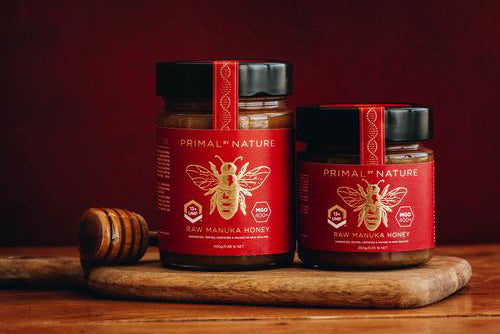Manuka honey from NZ comes in several different packaging options ranging in size and materials. Like many food products currently on the shelves, food appears to arrive in either glass or plastic containers.
Plastic containers are a popular choice within the food industry as they are affordable, durable and functional. However, glass always comes out on top as the best choice for the planet.
Pure monofloral Manuka honey is no different. So the real question to ask is, how long does Manuka honey last if it’s kept plastic or glass? Is there a difference? This blog is going to outline the impacts that both materials have on customers and the environment.
The Chemical Nature of Manuka Honey
As delicious as Manuka honey is, the natural composition of the velvet gold is actually slightly acidic. This means that honey in a metallic container will result in the metal becoming oxidised. Depending on the metals within the container, oxidising can have implications that would alter the Manuka honey taste.
Some events regarding improper Manuka honey storage can include:
- Many bubbles. Although tiny bubbles naturally occur within the honey, chemically altered honey may result in larger bubbles.
- Sour taste. Fermentation tends to occur within Manuka honey that has been improperly packaged - giving a very sour taste.
- Alcohol flavour. Degraded honey tends to have quite an alcoholic taste.
Plastic Containers for Manuka Honey
Plastic is used widely and is the most commonly used packaging globally. There are some benefits to using plastic, such as:
- Fewer raw materials used
- Less energy to make
- Produce small carbon footprint
However, these are very short-sighted positives compared to the enormous burdens of improper plastic disposal. Unfortunately, most people will throw away plastic without considering recycling. These containers can contain polyvinyl chlorides (or PVC), which can be toxic and harmful to the environment.
There is enormous evidence to show that plastic causes grave harm for many species - including marine life and seabirds. Many of which have become endangered or extinct within New Zealand. The Prime Minister’s Chief Science Advisor has stated that plastic waste kills one million seabirds, 100,000 sea mammals and marine turtles annually.
In addition, plastics contribute to raising global temperatures. According to WWF Australia, when plastic is in the ocean, the sun rays heat the particles within, which release potent greenhouse gases. This leads to a very alarming feedback loop whereby the increasing global temperature will increase the deposits of methane and ethylene - increasing the temperature further.
Glass Containers for Manuka Honey
In this day and age, glass is seen as an excellent alternative to plastic as it is far more recyclable and reusable than plastic. Plastic loses integrity after being recycled multiple times. Unlike plastic, however, glass has endless recycling possibilities; New Zealand prides itself on providing a thriving glass recycling program.
Many councils, businesses, and communities ensure glass gets recycled back into jars and bottles or offer them to companies that utilise them.
Some of the benefits of using glass include:
- Sourced from naturally abundant materials
- Will not degrade over time
- Will not leach chemicals into contents
- Safe to clean in the dishwasher
- 80% of recovered glass is made into new glass
Apart from the aesthetic feel and environmental benefits, glass packaging ensures that Manuka honey quality is kept in the best natural state. The non-porous and non-toxic surface has a high rate of impermeability that stops leaching and chemicals influencing the taste of the Manuka honey.
Primal by Nature - The Manuka Honey of Tomorrow
All Primal by Nature Manuka honey arrives on your doorstep in glass jars regardless of the level of MGO or UMF™. We believe that our pure New Zealand Manuka honey must be the best in every respect and should be available to consumers in the same eco-friendly packaging.
Primal by Nature eliminates the confusion surrounding Manuka honey UMF™ grading systems and standards. As a result, you will be made aware of what the different grades represent and be confident in buying a product that reflects an environmentally conscious brand.
Taking Manuka honey to the next level, every glass jar of Primal by Nature contains a potent primal burst of nature. To taste Manuka honey of this stature is to embrace nature itself. So take a look at our extensive selection of Manuka honey products and become one with nature.




